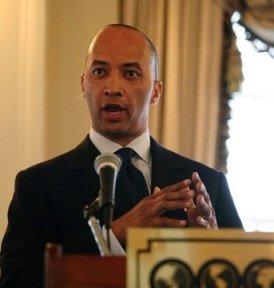2008 Scholarship Luncheon with Byron Pitts, CBS News
February 15, 2008
Byron Pitts, CBS News national correspondent, said the key ingredient to being a reporter is humility. “I don't interview people,” Pitts said. “I have a conversation. You're often talking to people at the worst time of their life. It's important to remember to be humble and respect people.”
Pitts spoke to the nearly 250 people assembled for the 17th annual Overseas Press Club Foundation Scholarship Luncheon at the Yale Club. Pitts has been based stateside for CBS news since 1998, but has gone far and wide to cover the war in Afghanistan, the military buildup in Kuwait, the Florida fires, the Elian Gonzalez story, the Florida recount, the mudslides in Central America and the refugee crisis in Kosovo, among many other stories.
Pitts invoked the notion of love, but not of the romantic notion.
“The kind of love you feel in the people you cover,” Pitts said. “Love not of fame or prestige, but love of truth, of decency and of words.”
After his speech, Pitts took questions from the audience and spoke about the absolute need for diversity in the press corps. He also returned to the idea of humility, saying that being humble is another plug for diversity.
“There's a real benefit when you bring diverse voices to the table,” Pitts said. “When a reporter is close to the subject, they don't report as an exercise, they report because it's personal. This makes the story more real for the audience.”
He recounted the coverage of Hurricane Katrina and how reporters repeatedly confused the story of people from New Orleans stating that “babies” were being killed in the Louisiana Superdome. It took a local reporter from the Times Picayune and a CBS News reporter who was originally from the area, to understand that “baby” is a reference to people in general, not exclusively children. This insight changed the misinformation and underscores for Pitts the necessity for diversity in newsrooms.
Pitts was asked if a reporter can be too close to the subject and skew the reporting. Pitts said that he relies on his grandmother's wisdom, “The truth may be funny, it may be painful, but good people can always manage the truth.”
Before lunch, New York Times reporter and 1998 OPC Foundation scholarship winner Damien Cave spoke. He said there is no clear path to being a foreign correspondent but that winning the scholarship gave him a vote of confidence in pursuing his dream of reporting from abroad.
Cave recently wrote an article that ran in the The New York Times Sunday Styles section. He said he requested this particular section to bring the reporting and strain of war coverage to a wider, and more home-oriented audience. Cave and his wife Diana Oliva Cave, who is a multimedia journalist for the Times, reported from Iraq this past year. Cave's January 20 article relays what it's like to be on assignment covering a war with a spouse.
Cave said that while journalism has a whole new set of tools, the fundamentals of reporting are still the same. “Now is an exciting time to be a journalist,” Cave said.
The 2008 winners, eight graduate students and four undergraduate students, were selected from a pool of applicants from 65 different colleges and universities. The winners come from Oberlin College, Indiana University, Yale University, Columbia University, Harvard University, New York University and the University of Oxford. Five and maybe six of this year’s winners also earned internships through the Foundation’s partnership relationships with the Associated Press, Reuters, Cambodia Daily and South China Morning Post. The Foundation will pay for the recipients’ travel and living expenses for one month as they work in foreign bureaus.
The winners each had a turn to address the audience after receiving their scholarship award and thanks the OPC Foundation for providing the funds to help them take their careers to the next level. The winners [see page 3] came from a variety of backgrounds and interests, and brought with them multiple languages that include Korean, Russian, Spanish, French, Mandarin, Arabic, Urdu, Hindi, and Swahili. The twelve scholarships they received were given in the names of veteran correspondents and news organizations. This year for the first time, the OPC Foundation presented the Standard and Poor’s Award for Economic and Business Reporting. The first recipient was Yu Sun of New York University.
Pitts closed his speech in a direct address to the scholarship winners with a quote from Horace Mann, who worked toward egalitarian and humanitarian values. “'Be ashamed to die until you have won some victory for humanity.' Remember, it's not what you take but what you give.”


